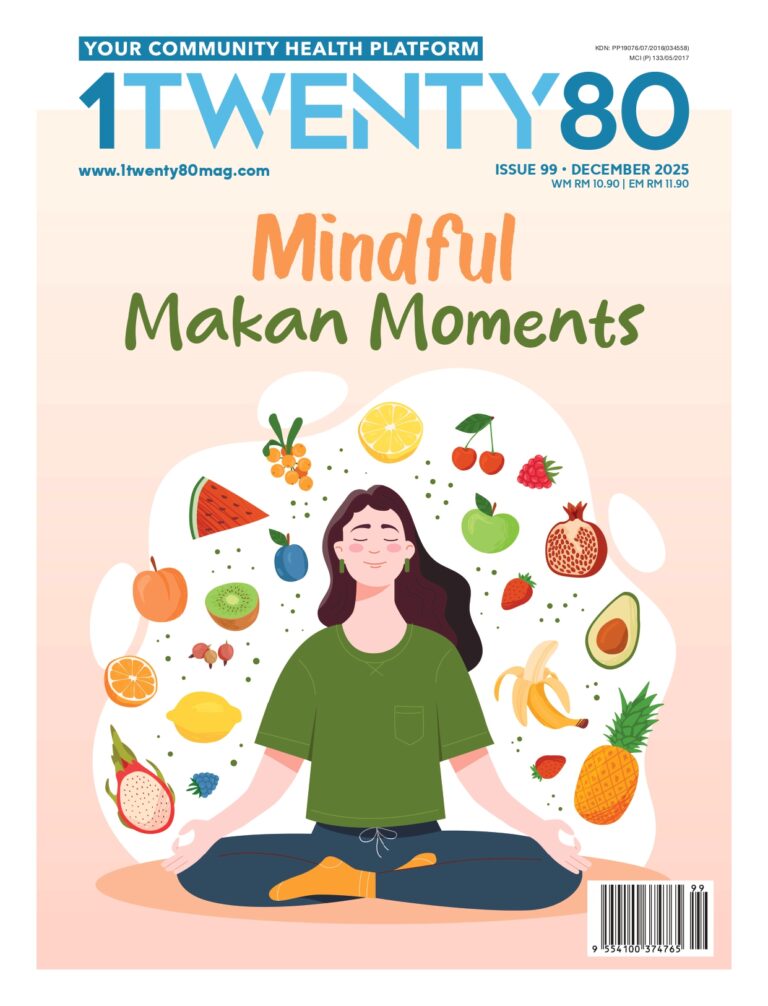Access to medicines shouldn’t be a privilege, and by bridging insurance, pharmacies, and preventive care, we can move towards a future of healthcare that’s accessible for all
Do you know of someone who had to delay or even forgo treatment because the cost of medication was simply too high? It’s a reality that plays out far too often, where access to healthcare isn’t just about availability, but affordability.
For Pharmacist, Fontaine Fong Mei Ling, giving isn’t just a value—it’s her way of life. Whether through her work, her active volunteering, or even small gestures of thoughtfulness, she embodies generosity in every sense.
With nearly two decades of experience spanning hospitals, community pharmacies, the corporate sector, and patient access initiatives, Fontaine now serves as a council member of Malaysian Pharmacists Society (MPS).
In this conversation with 1Twenty80, she shares heartfelt insights on how insurance, pharmacies, and preventive care can come together to ease the burden on patients.

1Twenty80: Could you tell us a bit about your career journey, and how it led you to where you are today?
Fontaine Fong: I’ve been a pharmacist by profession for almost two decades now, starting my career in a hospital pharmacy, later moved into community pharmacy, and eventually becoming the CEO of a pharmacy chain. During that time, I worked closely with patients on a daily basis and saw firsthand how many of them not only struggled medically but also financially, especially when it came to gaining access to their medications.
That’s when we set up initiatives to help patients get the treatments they needed. Later, I joined a pharmaceutical company as a Patient Access Manager, which deepened my involvement in this area. Patient access has always been very close to my heart, because falling sick is never a choice—and medicines should never be seen as a luxury. Everyone deserves the best treatment and care. That belief pushed me to explore financing options and eventually led me to understand more about the role of insurance.
Today, I’m the founder of Financial RX, where I bring together my experience in healthcare, patient access, and insurance to help bridge this gap.
As for the Malaysian Pharmacists Society (MPS), I first got involved thanks to my lecturer, Prof. Yeoh Peng Nam, who has instilled the seed for us to join MPS even as students. So, after graduating, I became a member right away and have been actively involved since the early days of my career. I was later elected to the council, and this is now my third term. Currently, I serve as the Deputy Treasurer, after previously holding two terms as a council member.
I’m very thankful that the council has given me the opportunity to use my experience and talents to contribute back to the profession and the society that has shaped my career.
1Twenty80: What inspired you to champion the area of insurance for pharmacies?
Fontaine Fong: As mentioned, patient access to medicines has always been very close to my heart. With my background in healthcare, insurance, and market access, I felt it was important to use that knowledge to explore how pharmacies can play a bigger role in the insurance sector.
Medication costs are rising, and issues like price transparency and affordability are becoming more pressing. At the same time, the only real way to reduce the heavy treatment burden and cost is to focus on preventive measures—and pharmacists play a key role in preventive care.
That’s why we started the Pharmacists Insurance Collaboration Committee under MPS. Through this initiative, we hope to start working with insurance stakeholders and policyholders to champion better recognition for pharmacists and to open up more opportunities for collaboration in this space.

1Twenty80: Are there countries or systems you look to as models for how insurance and pharmacy can work better together?
Fontaine Fong: In some countries, like Australia, pharmacists are reimbursed for providing preventive care services such as medication reviews and counselling. That’s something quite advanced, but it’s a model we can learn from.
Another area is long-term medication supply. If patients can collect their chronic medicines from pharmacies, it could actually help reduce costs. In fact, some large insurance companies already work with chain pharmacies to provide ongoing prescriptions at a lower cost. However, these projects mostly focus on big chain pharmacies, while in Malaysia, we have a mix of independent pharmacies, smaller chains, and larger ones. What we hope to do is encourage insurance companies to expand these opportunities so that all pharmacies—not just the chains—are recognised for their role, especially in preventive services.
Currently, medical insurance in Malaysia only covers hospitalisation. This includes pre- and post-hospitalisation treatment, but not long-term medication needs. Group insurance, however, is slightly different. For example, some large corporations provide additional benefits for their employees, which may include covering the cost of medicines. In these cases, insurance companies often partner with pharmacies to supply long-term prescriptions, which helps lower costs overall.
That said, we aren’t quite ready yet to integrate these models on a wider scale. But it’s a big and important topic, and one that we need to start having more conversations about.
1Twenty80: What would it take for preventive care services provided by pharmacists (such as screenings) to be routinely covered under insurance?
Fontaine Fong: Insurance companies are starting to recognise the importance of preventive care. In fact, some medical cards already include benefits where, if a person doesn’t make a claim in a given year, they are rewarded with coverage for preventive services such as health screenings or vaccinations. However, at the moment, pharmacies are not yet included as recognised providers.
Pharmacists are increasingly trained in preventive care—whether it’s screenings, smoking cessation support, or medication adherence reviews. These services complement the role of doctors, who focus on treating patients. In some cases, doctors may not have the time to provide the ongoing preventive support that pharmacists can. Importantly, pharmacists also know when a case requires a doctor’s attention and will always refer patients appropriately. It’s really about building a healthier ecosystem where both pharmacists and doctors work hand in hand.
Our vision is to have pharmacies recognised under insurance coverage for preventive services. This would not only give the public more convenient access, but also encourage more people to take preventive health seriously. When pharmacies are included as part of the insurance ecosystem, patients can choose the most accessible provider for them—whether it’s for a blood pressure check, or a medication review—without worrying about out-of-pocket costs. Ultimately, it’s about creating a system where everyone plays their role, and patients benefit the most.

1Twenty80: Do you think insurance coverage for these services could help strengthen pharmacist roles within the community?
Fontaine Fong: Yes, definitely. I believe that if insurance companies and pharmacies work on more collaborative projects, the public will be able to be diverted to pharmacies for preventive care. This would elevate the image of pharmacies beyond just being places to purchase medication.
Pharmacists are capable of providing a range of preventive health services such as diabetes counselling, weight management programmes, smoking cessation support, and medication reviews. These are service-based contributions, not price-based, and they make a real difference in people’s long-term health. More importantly, they help reduce the burden of non-communicable diseases, which is exactly the outcome that insurance providers aim for in the long run.
1Twenty80: Could you tell us more about your role in the Community Public Awareness Chapter at MPS?
Fontaine Fong: Community Public Awareness Chapter focuses on raising public awareness about the roles pharmacists play within the community. We do this through collaborations with public stakeholders and a variety of outreach programmes.
One of our initiatives is My Little Pharmacist, which plants the seed from a young age. Many children grow up knowing what doctors do, but very few understand what pharmacists do. This programme introduces kids to the profession in a fun and interactive way, and today, many pharmacies run their own My Little Pharmacist activities.
We also organise CSR initiatives such as medical outreach camps and medication adherence counselling in care centres, so people see firsthand that pharmacists do more than just dispense medicines. Another project we’re working on is Women and Kids Health, such as looking at women’s anaemia awareness. This initiative really shows the wider role that pharmacists play in supporting community health.

1Twenty80: In some countries, pharmacists have access to professional protections such as indemnity insurance. How important is this kind of support for pharmacists?
Fontaine Fong: Of course, in other countries, associations sometimes help their members purchase professional indemnity insurance as one of their benefits. This kind of protection is important because it gives pharmacists peace of mind while serving patients, knowing that they are professionally and financially safeguarded.
1Twenty80: Do you believe financial literacy should be part of pharmacists’ professional training, and if so, what areas would be most important to cover?
Fontaine Fong: As healthcare professionals, we are trained to look at patients holistically and support them throughout their journey. However, during our university days, financial literacy was not something we were taught.
I believe it’s important for pharmacists to have at least a basic understanding of financial matters in Malaysia, rather than relying solely on third parties. Being empowered with this knowledge allows us to make better decisions, both for our patients and for ourselves as professionals.

1Twenty80: What is your vision for the future role of pharmacists in healthcare?
Fontaine Fong: I envision pharmacists being recognised as the first point of contact when people think about preventive care. By empowering pharmacists in this way, we can collectively reduce both medical costs and the overall healthcare burden. It’s about shifting the mindset: think preventive first, rather than waiting until treatment is needed.











